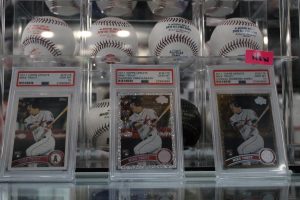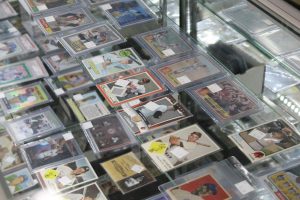- Video: https://youtu.be/ijDubDZCEVg
By Nick Hedges
Cronkite News
PHOENIX – The COVID-19 pandemic has ravaged businesses across Arizona, but not all sectors are hurting. In fact, some have actually benefited from the shutdown because people stayed at home.
Home improvement stores have seen sales spike from do-it-yourself projects. Garden supplies have flown off the pallets. Games and puzzles have sold at a brisk pace.
And the sports trading-card industry has experienced a marked uptick in sales and activity since the start of the pandemic in March as many locked down at home returned to favorite hobbies.
“Once everyone was forced to stay inside, we saw this outpouring of interest in sports cards and trading cards,” said Emily Kless, communications manager at the Topps Co., a leading producer of sports trading cards and collectibles. “People were trying to think of new ways to entertain themselves, and lo and behold, they went up to their attics and broke out their old shoebox of baseball cards.”
This change in the market got widespread attention in August when a one-of-a-kind Mike Trout rookie card sold for just less than $4 million at auction.
According to sales data provided by eBay to Sports Collectors Daily, sales of basketball cards on the site have increased by 130% since the beginning of the pandemic. Baseball and football cards have also seen an increase, shooting up by 50% and 47%, respectively.
The boost in basketball sales could also be attributed in-part to two well-known events happening beyond the pandemic. Kobe Bryant’s death in January caused his card sales to skyrocket by 600%, while the release of ESPN’s “The Last Dance,” which documented the Chicago Bulls dynasty of the 1990s, led to a 370% increase in sales of cards featuring the Bulls’ star, Michael Jordan.
The trading card business is booming worldwide, and many local collectors and dealers are enjoying the hobby’s resurgence.
While many of those involved are just getting started, Don Drooker and John Gola are no strangers to collecting and selling sports cards.
After meeting in a local card shop years ago, the two became friends and now work together to run AZ Sports Cards, located at the intersection of Camelback Road and 99th Avenue in Phoenix.
When Gola acquired the store in 2016, the pair wanted to create a place where the card-collecting community could gather and enjoy their new finds together.
Drooker likened the atmosphere of the shop to that of the NBC sitcom “Cheers.”
“It’s a real nice, casual atmosphere, and I think that lends itself to people feeling comfortable,” Drooker said. “You can sit around and watch a ballgame, open a pack of cards, or talk sports with your friends. It really feels like the sports-card version of the show.”
Drooker also noted that, since the onset of the COVID-19 pandemic, the store has been busier than ever.
“The store was successful before, but it’s even busier now,” Drooker said. “In the store and on eBay, the last several months have been really busy. It seems to me that people have been stuck at home and have either gotten into collecting or began collecting.”
Kless has no doubt that the surge in trading cards was fueled by the pandemic.
“It’s been a really exciting year for us, but nothing we saw coming,” she said.
While the trading card market has generally skyrocketed since the beginning of the pandemic, individual items still ebb and flow in value, akin to a sports-centric stock market. Instead of investing in shares of companies, collectors put their financial faith in player performance.
Drooker called it a “performance-driven” market, where current players see their cards’ values climb when they play well.
For instance, Topps has noticed a surge in the Southwest U.S. market thanks to the recent success of the San Diego Padres, according to Kless.
This could be attributed not only to the team’s record, but the Padres’ roster as well. San Diego fields several young players with high card values, namely shortstop Fernando Tatis Jr., whose autographed cards are routinely auctioned for several hundred dollars on eBay.
To track the volatility of the market, Cronkite News monitored eBay sales of a particular Luguentz Dort rookie card that features the former Arizona State guard’s signature.
Dort recently made headlines with his standout display in Game 7 of the Oklahoma City Thunder’s series against the Houston Rockets, in which he scored 30 points and put up a strong defensive effort against fellow Sun Devil alumnus James Harden.
And Dort is a rookie who started the season on a two-way contract with the Thunder and the NBA G League. Rookie cards often have the most long-term value if a player becomes a star.
In all, the Dort card tracked by Cronkite was sold or ended on eBay 61 times in the two-week period surrounding the game. In those transactions, 28 sales came within one day of the game’s scheduled tipoff. So, while this period only encompassed around 7% of the total monitored time, 46% of purchases happened during the game or not long after it.
Of all the deals done on eBay for the card, the price peaked at $50, 2 1/2 hours into the game, as Dort’s eye-catching performance unfolded.
In real time, collectors saw what Dort was doing and took to eBay to get their hands on a rookie card that could continue to climb in value. With the Thunder losing that game to the Rockets, those investors will have to wait until next season and beyond to determine whether their investment was wise – not unlike someone purchasing a share of Tesla stock.
The market on eBay is commonly flooded when players have breakout performances like Dort’s, according to Drooker.
While the trading card market will continue strongly during the pandemic, it is unclear whether the hobby will sustain its recent development over the long haul.
Local collector Jordan Kopcio, an active trader on eBay, believes that things will continue to improve for the sports card market.
“When COVID is done, I think it will stay the same,” Kopcio said. “There’s always going to be the next star or collectible card, or that next step people are going for, so I think the market will still end up strong.”
Whether or not the trading card market will continue to boom in a post-pandemic world or not, the hobby helped many people get through a lockdown period without live sports.
“Sports cards were really able to help people stay connected to the sports that they love and the players that they love,” Kless said. “While there weren’t sports on our TVs, and while we couldn’t go out to a ballgame, a lot of people turned to sports cards as a way to feel connected to the game and the sports or teams that interest them.”
For more stories from Cronkite News, visit cronkitenews.azpbs.org.


